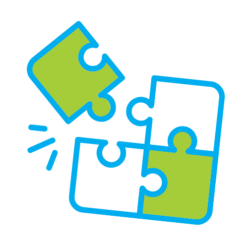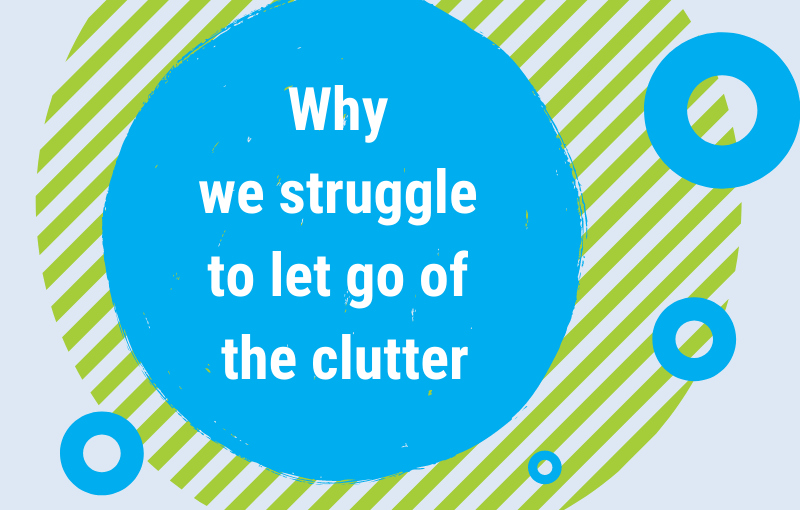THE CLUTTER SERIES
The ‘Clutter Series’ discusses important aspects of the clutter in our homes and minds, including the close relationship between clutter and our general wellbeing.
Click here to read a summary of the main insights of this series.
What causes clutter? – Part 2: The outflow of no longer needed belongings is too low
The imbalance of inflows and outflows
The constant inflow of new belongings becomes a problem for many of us because we don’t ensure that it’s met by a constant outflow of things.
We don’t admit that we bought something we actually don’t need and don’t use. And so we keep it, out of guilt or shame, or just because we forget about its existence.
Also, we don’t pay attention to that point in time when our formerly needed and used belongings have done their job and become clutter. We keep them, too.
Why do we struggle to make decisions and to let go of what no longer serves us?
There are as many reasons why clutter is kept as there are people who keep clutter.
We all have our very personal reasons and explanations.
Some of them are:
The remaining financial value
We are hesitant to give away things that we spent a lot of money on. We believe that the items still hold a high value because we remember what we spent on them. It feels wasteful to just let them go.
Feelings of guilt or shame
We keep things because we feel guilty for the money we spent on them already and don’t want to feel even more guilt for giving them away – although we don’t use them (any longer).
Guilt is also holding us back from letting go of things we have been given as gifts and have never used/liked.
Holding on to the past
We might still appreciate and feel grateful for the value that some of our belongings have added to our life in the past. Now we continue to hold on to them because we still cling to our past and struggle to let go of anything that relates to ‘the good old times’.
Avoiding change
Change is seldom easy and letting go of things equals actively making changes in our lives. This can feel terrifying. Thus, we prefer to persuade ourselves that we are comfortable with how things are now and that there is no need to change/declutter anything.
Avoiding decision-making
The success of any decluttering process depends on our willingness to make decisions. Decision-making sucks energy. And it’s risky. What if we decide to give something away and later regret that?
General fear of letting go
As soon as we start to consider getting rid of things, we begin to rationalise how useful they might potentially be, even if we haven’t used them for years. Suddenly something we have nearly forgotten about becomes an important possession again.
Lack of self-awareness
We can’t say with confidence what’s important to us and has to be kept, and what’s no longer important and can go. This happens when we are not aware of our core values. We can’t decide what items no longer serve us if we don’t know what actually does serve us and adds value to our life.
Lack of declutter-skills
Some of us grew up in a cluttered environment and/or never were taught how to organise and arrange our households and belongings. If we don’t know how to do the decluttering and how to start, it’s no wonder that we never start.
Lack of time
Not having enough time to declutter has to do with our priorities. If our days are filled with tasks and work we value higher than our decluttering project, we feel it’s justified to postpone the clearing job again and again.
Desiring, buying and owning things is not the problem when it comes to clutter.
The problem comes when we are not willing or able to take full responsibility for the consequences that our decisions about the inflow and outflow of things have on our home and our life.
Creating greater self-awareness results in better decision-making,
it is the necessary first step of our journey into a clutterfree life:
-
- Becoming aware of our core values helps us to determine what’s important to us and what’s not.
- Defining our purpose, the vision of the current or next chapter in our life, ensures that we can confidently decide what not longer serves us and holds us back in the past.
- Honestly assessing our belief systems and emotions enables us to uncover the self-limiting feelings and behaviours that contribute to the creation of the clutter in our homes/lives.
- Evaluating our personal strengths and weaknesses allows us to identify the skill sets we intend to develop ourselves and the type and extent of support we need from others.
HOW CAN I HELP YOU?
Are you tired?
Tired of trying to (re)organise the various areas of your life entirely on your own?
Fortunately, you don’t have to figure it out all by yourself.
We can do it together.
You can decide to get my support, advice, and guidance – and achieve the desired changes in your life so much faster and easier.

